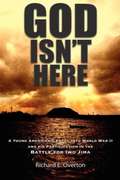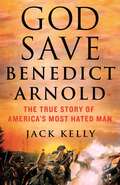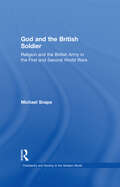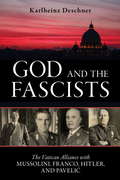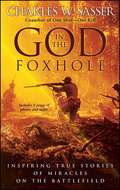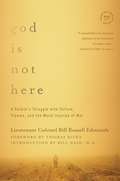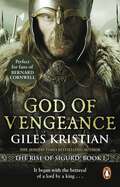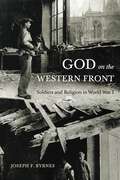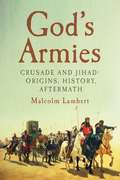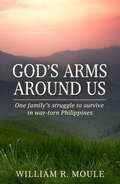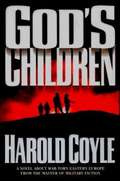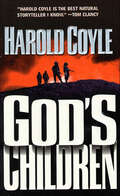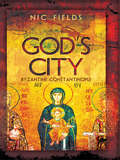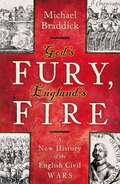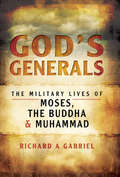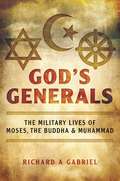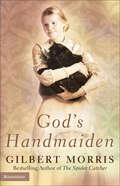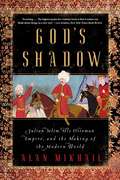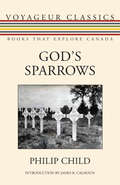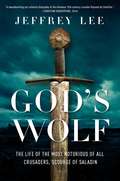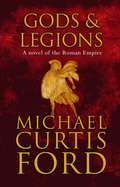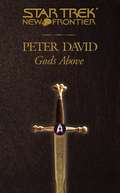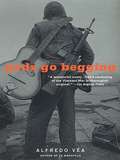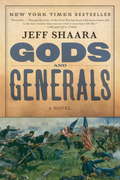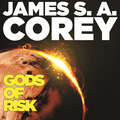- Table View
- List View
God Isn't Here: A Young Man's Entry into World War II and His Participation in the Battle for Iwo Jima
by Richard E. OvertonWith attention to detail only an eyewitness can offer, Overton's gut-wrenching memoir of the battle at Iwo Jima captures the insufferable horrors of combat at the greatest battle of the modern era.
God Save Benedict Arnold: The True Story of America's Most Hated Man
by Jack KellyFinalist, New England Book Awards"Vivid." —The Wall Street Journal"A dazzling addition to the history of the American Revolution." ―Kirkus Review (starred)"Finally... a full and fascinating portrait of a true hero of the American Revolution, until he was visited by villainy. A riveting read." ―Tom Clavin, New York Times bestselling author of Follow Me to HellBenedict Arnold committed treason— for more than two centuries, that’s all that most Americans have known about him.Yet Arnold was much more than a turncoat—his achievements during the early years of the Revolutionary War defined him as the most successful soldier of the era. GOD SAVE BENEDICT ARNOLD tells the gripping story of Arnold’s rush of audacious feats—his capture of Fort Ticonderoga, his Maine mountain expedition to attack Quebec, the famous artillery brawl at Valcour Island, the turning-point battle at Saratoga—that laid the groundwork for our independence.Arnold was a superb leader, a brilliant tactician, a supremely courageous military officer. He was also imperfect, disloyal, villainous. One of the most paradoxical characters in American history, and one of the most interesting. GOD SAVE BENEDICT ARNOLD does not exonerate him for his treason—the stain on his character is permanent. But Kelly’s insightful exploration of Arnold’s career as a warrior shines a new light on this gutsy, fearless, and enigmatic figure. In the process, the book offers a fresh perspective on the reasons for Arnold’s momentous change of heart.
God and the British Soldier: Religion and the British Army in the First and Second World Wars (Christianity and Society in the Modern World)
by Michael SnapeDrawing on a wealth of new material from military, ecclesiastical and secular civilian archives, Michael Snape presents a study of the experience of the officers and men of Britain’s vast citizen armies, and also of the numerous religious agencies which ministered to them. Historians of the First and Second World Wars have consistently underestimated the importance of religion in Britain during the war years, but this book shows that religion had much greater currency and influence in twentieth-century British society than has previously been realised. Snape argues that religion provided a key component of military morale and national identity in both the First and Second World Wars, and demonstrates that, contrary to accepted wisdom, Britain’s popular religious culture emerged intact and even strengthened as a result of the army’s experiences of war. The book covers such a range of disciplines, that students and scholars of military history, British history and Religion will all benefit from its purchase.
God and the Fascists
by Karlheinz DeschnerNow available in English for the first time, a controversial work that indicts the Vatican for its actions before and during World War II. In the decade preceding the outbreak of World War II, the Vatican made a devil's bargain with fascist leaders. Anticipating that their regimes would eliminate a common enemy--namely Marxist-Leninist communism--two popes essentially collaborated with Hitler, Mussolini, and the fascist dictators in Spain (Franco) and Croatia (Pavelić). This is the damning indictment of this well-researched polemic, which for almost five decades in Germany has sparked controversy, outrage, and furious debate. Now it is available in English for the first time. Many will dismiss Deschner--who himself was raised and educated in a pious Catholic tradition--as someone who is obsessed with exposing the failings of the church of his upbringing. But he has marshaled so many facts and presented them with such painstaking care that his accusations cannot easily be ignored. The sheer weight of the evidence that he has brought together in this book raises a host of questions about a powerful institution that continues to exercise political influence to this day.
God in the Foxhole: Inspiring True Stories of Miracles on the Battlefield
by Charles W. SasserFrom veteran military writer Charles Sasser comes a collection of inspiring personal accounts of American soldiers whose faith has guided them through the hardships of war.From the battlefields of the American Civil War through World Wars I and II, from Korea and Vietnam to the front lines in Iraq and Afghanistan, soldiers of all faiths have struggled for understanding and called on a higher power when faced with the realities of combat. God in the Foxhole is a stunning collection of true personal accounts from generations of American soldiers whose faith, in the words of author Charles W. Sasser, "has been born, reborn, tested, sustained, verified, or transformed under fire." A renowned master of combat journalism and a former Green Beret, Sasser has gathered an immensely moving collection of war stories like no other—stories of spirituality, conversion, and miracles from the battlefield. Be they Christian, Jewish, Muslim, or atheist, churched since childhood or touched by the divine for the first time, here are the riveting experiences of army privates, bomber pilots, navy lieutenants, marines, prisoners of war, medics, nurses, chaplains, and others who, under desperate circumstances and with every reason to fear for their lives, found unknown strength, courage, and heroism through their remarkable faith. These inspiring accounts transcend the explainable to become stunning portraits of survival and belief: the angelic vision that brought inner peace to an exhausted helicopter door gunner in Vietnam; the makeshift full-immersion baptisms of eleven soldiers on Palm Sunday in Iraq, 2004; two enemies—a Nazi priest and an American G.I.—who served Communion Mass in a Belgian sanctuary in 1944; the prescient letter from a Civil War army major to his beloved wife, one week before his death at Bull Run; the 21st-century toddler with a jaw-dropping spiritual connection to a war hero of Iwo Jima, and dozens more. A war chronicle like no other, God in the Foxhole affirms, for military buffs and readers from all walks of life, the power of faith in the face of adversity.
God is Not Here: A Soldier's Struggle with Torture, Trauma, and the Moral Injuries of War
by Thomas Ricks Bill Nash Lieutenant Colonel Edmonds George LoberGod Is Not Here is a powerful and intimate look into torture and its effect on both the tortured and the torturer. In May of 2005, the U.S. government finally acknowledged that the invasion of Iraq had spawned an insurgency. With that admission, training the Iraqi Forces suddenly became a strategic priority. Lt. Col. Bill Edmonds, then a Special Forces captain, was in the first group of "official" military advisors. He arrived in Mosul in the wake of Abu Ghraib, at the height of the insurgency, and in the midst of America's rapidly failing war strategy. Edmonds' job was to advise an Iraqi intelligence officer--to assist and temper his interrogations--but not give orders. But he wanted to be more than a wallflower, so he immersed himself in the experience, even learning Arabic. In a makeshift basement prison, over countless nights and predawn hours, Edmonds came to empathize with Iraqi rules: do what's necessary, do what works. After all, Americans and Iraqis were dying. Edmonds wanted to make a difference. Yet the longer he submerged himself in the worst of humanity, the more conflicted and disillusioned he became, slowly losing faith in everything and everyone. In the end, he lost himself. He returned home with no visible wounds, but on the inside he was different. He tried to forget--to soldier on--but memories from war never just fade away... In God Is Not Here, the weight of history is everywhere, but the focus is on a young man struggling to learn what is right when fighting wrong. Edmonds provides a disturbing and thought-provoking account of the morally ambiguous choices faced when living with and fighting within a foreign religion and culture, as well as the resulting psychological and spiritual impacts on a soldier. Transcending the genre of the traditional war memoir, Edmonds' eloquent recounting makes for one of the most insightful and moving books to emerge from America's long war against terrorism.
God of Vengeance: (The Rise of Sigurd 1): A thrilling, action-packed Viking saga from bestselling author Giles Kristian (Sigurd #1)
by Giles KristianA glorious, bloody, perfect Viking saga of honour, courage, blood feud and revenge from the Sunday Times bestselling author of Lancelot, Giles Kristian. Perfect for fans of Bernard Cornwell and Games of Thrones."Unrelenting pace, brilliant action and characters. A masterwork." - CONN IGGULDEN"Action-packed storytelling which stirs the blood and thrills the soul" - WILBUR SMITH"Easily one of the best books I've had the pleasure to read" - ***** Reader review.*******************************************************************************IT BEGAN WITH THE BETRAYAL OF A LORD BY A KING...Norway 785 AD. When King Gorm puts Jarl Harald's family to the sword, he makes one fatal mistake - he fails to kill Harald's youngest son, Sigurd.His kin slain, his village seized, his taken as slaves, Sigurd wonders if the gods have forsaken him. Hunted by powerful men, he is unsure who to trust and yet he has a small band of loyal followers at his side. With them - and with the help of the All-Father, Odin - he determines to make a king pay for his treachery.Using cunning and war-craft, Sigurd gathers together a fellowship of warriors - including his father's right-hand man Olaf, Bram (who men call Bear), Black Floki who wields death with a blade, and the shield maiden Valgerd, who fears no man - and convinces them to follow him. For, whether Ódin is with him or not, Sigurd WILL have vengeance. And neither men nor gods had best stand in his way . . .Sigurd's story continues in Winter's Fire.
God on the Western Front: Soldiers and Religion in World War I
by Joseph F. ByrnesFrom 1914 to 1918, religious believers and hopeful skeptics tried to find meaning and purpose behind divinely willed destruction. God on the Western Front is a history of lived religion across national boundaries, religious affiliations, and class during World War I, utilizing an expansive record of primary sources.Joseph F. Byrnes takes readers on a tour of the battlefields of France, listening to the words of German, French, and English soldiers; going behind the lines to hear from the men and women who provided pastoral and medical care; and reviewing the religious writings of priests, bishops, ministers, and rabbis as they tried to make sense of it all. The story begins with citizens at home as they responded to the obligation to make war and then focuses on the “God-talk” and “nation-talk” that soldiers used to express their foundational religious experiences. Byrnes’s study attends to the words of average men who struggled to articulate their religious sentiments, alongside the generals Helmuth von Moltke, Ferdinand Foch, and Douglas Haig and the soldier theologians Franz Rosenzweig, Paul Tillich, Pierre Teilhard de Chardin, and Geoffrey Studdert Kennedy. In doing so, he shows how religious and battle experience are intertwined and showcases the wide range of spiritual responses that emerged across boundaries.Going beyond the typical constraints of studies focused either on one nation or one confessional affiliation, Byrnes’s international and interfaith approach breaks new ground. It will appeal to scholars and students of modern European history, religious history, and the history of war.
God's Armies: Origins, History, Aftermath
by Malcolm LambertWith ramifications on geopolitics today, a vivid chronicle of the Christian and Islamic struggle to control the sacred places of Palestine and the Middle East between the seventh and thirteenth centuries. Crusade and jihad are often reckoned to have represented two sides of the same coin: each resonated on the opposing sides in the holy wars of the Middle Ages and each has been invoked during the war on terror. A chronicle of the Christian and Islamic struggle to control the sacred places of Palestine and the Middle East between the seventh and thirteenth centuries, this dynamic new history demonstrates that this simple opposition ignores crucial differences. Placing an equal emphasis on the inner histories of Christianity and Islam, the book traces the origins and development of crusade and jihad, showing for example that jihad reflected internal tensions in Islam from its beginnings. The narrative also reveals the ways in which crusade and jihad were used to disguise ambitions for power and to justify atrocity and yet also inspired acts of great chivalry and heroic achievement. The story brims with larger than life characters, among them Richard the Lionheart, Nur al-Din, Saladin, Baybars, and Ghengiz Khan. Lambert concludes by considers the long after-effects of jihad and crusade, including the role of the latter in French imperialism and of the former in the wars now afflicting the Middle East and parts of Africa. This vivid, balanced account will interest all readers who wish to understand the complexities of the medieval world and how it relates our own.
God's Arms Around Us
by William R. MouleGod's Arms Around Us, first published in 1960, is author William Moule's account of his and his family's harrowing 3-1/2 years in the Philippines during the Second World War. Moule, an American miner working in the Philippines, his wife (who was expecting a baby), and their two young children found themselves caught up in the brutal conflict being waged by the occupying Japanese. Rather than go into an internment camp - and believing that the war would soon be over - the Moules attempted to find refuge in the mountainous terrain of Luzon. However, the Moules were forced to be continually on the move, climbing mountains, fording streams, hiking through unfamiliar terrain at night, with an ever-present threat from roving enemy patrols. Yet through it all, William Moule maintained his strong faith in God ('He would keep His arms around them') and his Irish sense of humor. His wife, Marge, very seldom failed to smile with him. By 1943, however, severely weakened by malaria, the family could no longer stay on the run. Captured, they were taken first to Japanese garrisons, then to Camp Holmes, and later to the infamous Bilibid Prison in Manila. While imprisoned, Moule was tortured in an attempt to uncover his presumed part in guerrilla activities. Finally, the Moules and other prisoners were freed by American soldiers, and make their way back to the United states. "Marge and I," said William Moule, "brought three little kids through an ordeal that most single men couldn't survive, but we had the will to survive, and we had faith." Sadly, William and Marge Moule were killed in a car accident in Nevada in 1989, leaving behind their now large family of 12 children.
God's Children
by Harold CoyleA tale of high-tech warfare set in the near future, this is the story of the 3rd Platoon, C Company, 2nd Battalion of the 13th Infantry, and 2 young officers who attempt to keep the peace.
God's Children (Nathan Dixon #1)
by Harold Coyle“The modern master of life-under-combat [delivers] an engrossing, uncompromisingly suspenseful tale” of high-tech warfare (Kirkus Reviews).As the Good Book says, “Blessed are the Peace Keepers, for they will be called God’s Children.” Yet for American soldiers deployed to warzones on foreign soil, peacekeeping is not child’s play. In this action-filled technothriller, author and military expert Harold Coyle examines some of the most pressing issues facing today’s soldiers.When ethnic tensions in near-future Slovakia reach a boiling point, the US Army sends troops to join a NATO force in the region. God’s Children tells the story of 3rd Platoon, C Company, 2nd Battalion of the 13th Infantry, and two young officers who try to keep a peace that is falling apart before their very eyes.
God's City: Byzantine Constantinople
by Nic FieldsByzantium. Was it Greek or Roman, familiar or hybrid, barbaric or civilized, Oriental or Western? In the late eleventh century Constantinople was the largest and wealthiest city in Christendom, the seat of the Byzantine emperor, Christs vice-regent on earth, and the center of a predominately Christian empire, steeped in Greek cultural and artistic influences, yet founded and maintained by a Roman legal and administrative system. Despite the amalgam of Greek and Roman influences, however, its language and culture was definitely Greek. Constantinople truly was the capital of the Roman empire in the East, and from its founding under the first Constantinus to its fall under the eleventh and last Constantinus the inhabitants always called themselves Romaioi, Romans, not Hellniks, Greeks. Over its millennium long history the empire and its capital experienced many vicissitudes that included several periods of waxing and waning and more than one golden age.Its political will to survive is still eloquently proclaimed in the monumental double land walls of Constantinople, the greatest city fortifications ever built, on which the forces of barbarism dashed themselves for a thousand years. Indeed, Byzantium was one of the longest lasting social organizations in history. Very much part of this success story was the legendary Varangian Guard, the lite body of axe-bearing Northmen sworn to remain loyal to the true Christian emperor of the Romans. There was no hope for an empire that had lost the will to prosecute the grand and awful business of adventure. The Byzantine empire was certainly not of that stamp.
God's Fury, England's Fire: A New History of the English Civil Wars
by Michael BraddickThe sequence of civil wars that ripped England apart in the seventeenth century was the single most traumatic event in this country between the medieval Black Death and the two world wars. Indeed, it is likely that a greater percentage of the population were killed in the civil wars than in the First World War. This sense of overwhelming trauma gives this major new history its title: God’s Fury, England’s Fire. The name of a pamphlet written after the king’s surrender, it sums up the widespread feeling within England that the seemingly endless nightmare that had destroyed families, towns and livelihoods was ordained by a vengeful God – that the people of England had sinned and were now being punished. As with all civil wars, however, ‘God’s fury’ could support or destroy either side in the conflict. Was God angry at Charles I for failing to support the true, protestant, religion and refusing to work with Parliament? Or was God angry with those who had dared challenge His anointed Sovereign?Michael Braddick’s remarkable book gives the reader a vivid and enduring sense both of what it was like to live through events of uncontrollable violence and what really animated the different sides. The killing of Charles I and the declaration of a republic – events which even now seem in an English context utterly astounding – were by no means the only outcomes, and Braddick brilliantly describes the twists and turns that led to the most radical solutions of all to the country’s political implosion. He also describes very effectively the influence of events in Scotland, Ireland and the European mainland on the conflict in England.God’s Fury, England’s Fire allows readers to understand once more the events that have so fundamentally marked this country and which still resonate centuries after their bloody ending.
God's Generals: The Military Lives of Moses, the Buddha & Muhammad
by Richard A. GabrielIt is one of the more startling facts of military history that the founders of three of the four 'great religions'—Judaism, Buddhism, and Islam—were also accomplished field generals with extensive experience in commanding men in battle. One of these, Muhammad, fought eight battles and was wounded twice, once almost fatally. Another, Siddhartha Gautama (later to become the Buddha), witnessed so much battlefield carnage that he suffered a psychological collapse. Moses had become so much a 'god-intoxicated' personality, it is a reasonable suspicion that he, like the Buddha, was murdered. Indeed, had the experiences of these men in war not been so successful, it is quite possible that their achievements as religious leaders would never have occurred. For all three, war and religion were so closely intertwined in their personalities that it is difficult to discern where the influence of one ended and the other began. This book attempts to explore the military lives of Moses, the Buddha and Muhammad, and the role their war experiences played in their religious lives.
God's Generals: The Military Lives of Moses, the Buddha, and Muhammad
by Richard A. GabrielExamines how the military experience of three religious founders shaped their spiritual legacy.It is one of the more startling facts of military history that the founders of three of the four "great religions"-Judaism, Buddhism, and Islam-were also accomplished field generals with extensive experience in commanding men in battle. One of these, Muhammad, fought eight battles and was wounded twice, once almost fatally. Another, Siddhartha Gautama (later to become the Buddha), witnessed so much battlefield carnage that he suffered a psychological collapse. Moses had become so much a "god-intoxicated" personality that it is a reasonable suspicion that he, like the Buddha, was murdered.Indeed, had the experiences of these men in war not been so successful, it is quite possible that their achievements as religious leaders would never have occurred. For all three, war and religion were so closely intertwined in their personalities that it is difficult to discern where the influence of one ended and the other began.This book attempts to explore the military lives of Moses, the Buddha, and Muhammad, and the role their war experiences played in their religious lives.Skyhorse Publishing, as well as our Arcade imprint, are proud to publish a broad range of books for readers interested in history--books about World War II, the Third Reich, Hitler and his henchmen, the JFK assassination, conspiracies, the American Civil War, the American Revolution, gladiators, Vikings, ancient Rome, medieval times, the old West, and much more. While not every title we publish becomes a New York Times bestseller or a national bestseller, we are committed to books on subjects that are sometimes overlooked and to authors whose work might not otherwise find a home.
God's Handmaiden
by Gilbert MorrisA historical and romantic adventure woven around the story of Florence Nightingale.Gervase Howard is in her mid-teens when her working-class mother dies and she must go to live with relatives in service to a wealthy, noble family, outside of London. While learning various jobs, she is drawn to the eldest son, Davis. Her fascination with him grows deeper, but more hopeless, since the two are separated not just by class, but also by Davis’s love for Roberta.When Davis announces his engagement, he asks Gervase to join them as Roberta’s maid. But instead Gervase becomes a companion to Florence Nightingale and accompanies her when the Crimean War breaks out and she is asked to create a corps of nurses. On the field, Gervase crosses paths with Davis, who has become disillusioned in his marriage and is drawn to her warmth and care. Both know, however, there is nothing more for them than friendship.Upon her return to England, Gervase receives word that Davis has been seriously injured in a fall and is asked to nurse him back to health. As he regains consciousness, he reveals shocking news that plunges them both into danger.
God's Shadow: Sultan Selim, His Ottoman Empire, And The Making Of The Modern World
by Alan Mikhail“A stunning work of global history. . . . Alan Mikhail offers a bold and thoroughly convincing new way to think about the origins of the modern world. . . . A tour de force.” —Greg Grandin Long neglected in world history, the Ottoman Empire was a hub of intellectual fervor, geopolitical power, and enlightened pluralistic rule. At the height of their authority in the sixteenth century, the Ottomans, with extraordinary military dominance and unparalleled monopolies over trade routes, controlled more territory and ruled over more people than any world power, forcing Europeans out of the Mediterranean and to the New World. Yet, despite its towering influence and centrality to the rise of our modern world, the Ottoman Empire’s history has for centuries been distorted, misrepresented, and even suppressed in the West. Now Alan Mikhail presents a vitally needed recasting of Ottoman history, retelling the story of the Ottoman conquest of the world through the dramatic biography of Sultan Selim I (1470–1520). Born to a concubine, and the fourth of his sultan father’s ten sons, Selim was never meant to inherit the throne. With personal charisma and military prowess—as well as the guidance of his remarkably gifted mother, Gülbahar—Selim claimed power over the empire in 1512 and, through ruthless ambition, nearly tripled the territory under Ottoman control, building a governing structure that lasted into the twentieth century. At the same time, Selim—known by his subjects as “God’s Shadow on Earth”—fostered religious diversity, welcoming Jews among other minority populations into the empire; encouraged learning and philosophy; and penned his own verse. Drawing on previously unexamined sources from multiple languages, and with original maps and stunning illustrations, Mikhail’s game-changing account “challenges readers to recalibrate their sense of history” (Leslie Peirce), adroitly using Selim’s life to upend prevailing shibboleths about Islamic history and jingoistic “rise of the West” theories that have held sway for decades. Whether recasting Christopher Columbus’s voyages to the “Americas” as a bumbling attempt to slay Muslims or showing how the Ottomans allowed slaves to become the elite of society while Christian states at the very same time waged the horrors of the transatlantic slave trade, God’s Shadow radically reshapes our understanding of the importance of Selim’s Ottoman Empire in the history of the modern world.
God's Sparrows
by Michael Gnarowski James R. Calhoun Philip ChildA new edition of Philip Child’s great Canadian novel of the First World War. A horrifying description of war, specifically embodied in the vain and inglorious futility of the First World War, God’s Sparrows is a novel rich in compassion and firm in its faith in the human spirit. Philip Child created a Canadian family saga, a modern pilgrim’s progress in which individuals surmount the corrosive effects of brutality, maintaining their ability to love and endure under the most agonizing circumstances. His book, first published in 1937, remains as a stirring testimony to that ability. It offers profound insight into the experience of the First World War, not just as a catastrophe affecting his characters but as a crucible in which the whole of this nation found itself tried.
God's Wolf: The Life Of The Most Notorious Of All Crusaders, Scourge Of Saladin
by Jeffrey Lee“[Jeffrey Lee] brings a blockbuster sensibility to this slice of the 12th century Levant.”—Dan Jones, Sunday Times (UK) In a 2010 terrorist plot, Al-Qaeda hid a bomb in a FedEx shipment addressed to a man who had been dead for 800 years. Born in twelfth-century France and bred for violence, Reynald de Chatillon was a young knight who joined the Second Crusade and rose through the ranks to become the preeminent figure in the crusader Kingdom of Jerusalem, chief foe of the Muslim leader Saladin, and one of the most reviled characters in Islamic history. In the West, Reynald has long been considered a minor player in the crusading saga, and is often dismissed as a bloodthirsty maniac who brought disaster on his fellow crusaders. However, by using contemporary documents and original research, Jeffrey Lee overturns this popular perception and questions other prejudices about the crusades that underlie modern misunderstandings of the Middle East. God’s Wolf shows how the crusader kingdom was brought down by a treacherous internal faction, rather than by Reynald’s belligerence. In fact, despite Reynald’s brutality, Lee argues that he was a strong military leader and an effective statesman, whose actions in the Middle East had a far-reaching impact that endures to this day. An epic saga set in the midst of a violent clash of civilizations, God’s Wolf is the fascinating story of an exceptional crusader and a provocative reinterpretation of the crusading era.
Gods & Legions: A Novel of the Roman Empire
by Michael Curtis FordRanging from the forbidding forests of ancient Gaul to the sweltering sands of Persia, Gods & Legions is a breathtaking historical re-creation of one of the most dangerous periods - and enduring mysteries - of all time. Perfect for fans of Simon Scarrow, Ben Kane, Conn Iggulden, Harry Sidebottom and S.J.A. Turney.354 AD. Julian, a young scholar in Athens, is the last survivor of a bloody political purge that killed his entire family. Unexpectedly summoned to the court of the Emperor Constantius, he fears the worst-only to find himself bearing the ring of Caesar of the Western Empire.Tested by bloody battle and the scepticism of the Roman legions, Julian proves to be a military genius, crushing the German tribes that have threatened Rome for generations. Soon after, defying his own emperor against overwhelming odds, he risks civil war and ultimately seizes the Empire for himself, becoming the most powerful man in the world while still only thirty.Now the dark side of his ambition emerges. Julian discards the Christianity of his boyhood and sets his sights on the greatest conquest of all-the Persian Empire. In Persia, however, his gods and his sanity desert him, and in one swift stroke, the course of history is altered forever.'Stirring and adventurous tragedy of the first rank, written with all the gusto of a master pulp stylist' - Kirkus Reviews______________________________REAL READERS LOVE GODS & LEGIONS:'I highly recommend this book' Goodreads member'A great book that puts you in the time when the Roman Empire was divided into the western and eastern empire' Goodreads member
Gods Above (Star Trek #13)
by Peter DavidCaptain Mackenzie Calhoun has often been accused of playing God, but he has never faced off against real gods -- until now. As Captain Kirk did before him, Calhoun has encountered beings of unnatural power and abilities verging on godhood, and who claim to be the very individuals who inspired the Greek, Roman, Norse, and, other pantheons from Earth culture. These beings say that all they want is our worship, and in return for it will provide us with a peaceful galaxy-wide paradise of perfect health and endless pleasure. When the Federation, in the person of Captain Calhoun and the crew of the U.S.S. Excalibur, refused their offer, the resulting battle left Morgan Primus dead and Lieutenant Mark McHenry, whose own powers over time and space had proved to be substantial, in a limbo beyond death. Now, with a wounded ship and an injured crew, Captain Calhoun, along with Captain Shelby and the crew of the Trident, must face these god-like beings once again, with the fate of galactic civilization at stake.
Gods Go Begging
by Alfredo Vea"Luminous... a beautiful book." - Carolyn See For Vietnam veteran Jesse Pasadoble, now a defense attorney living in San Francisco, the battle still rages: in his memories, in the gang wars erupting on Potrero Hill, and in the recent slaying of two women: one black, one Vietnamese. While seeking justice for the young man accused of this brutal double murder, Jesse must walk with the ghosts of men who died on another hill... men who were his comrades and friends in a war that crossed racial divides. Gods Go Begging is a new classic of Latino literature, a literary detective novel that moves seamlessly between the jungles of Vietnam and the streets of modern day San Francisco. Described as "John Steinbeck crossed with Gabriel García Márquez", Véa weaves a powerful and cathartic story of war and peace, guilt and innocence, suffering and love - and of one man's climb toward salvation.
Gods and Generals: A Novel of the Civil War (Civil War Trilogy #1)
by Jeff ShaaraBring back the pleasure of reading, readJeff Shaarain Large Print. All Random House Large Print Editions are published in a 16-point typeface. The story ofGods and Generalsbegins with Michael Shaara, author of the Pulitzer Prize-winning classicThe Killer Angels. A native of New Jersey, Michael Shaara grew to be an adventurous young man: over the years, he found work as a sailor, a paratrooper, a policeman, and an English professor at Florida State University. In 1952, his son Jeff was born in New Brunswick, New Jersey. Michael's interest in Gettysburg was prompted by some letters written by his great-grandfather, who had been wounded at the great battle while serving with the 4th Georgia Infantry. In 1966, he took his family on a vacation to the battlefield and found himself moved. In 1970, Michael Shaara returned to Gettysburg with his son Jeff. The pair crisscrossed the historic site, gathering detailed information for the father's novel-in-progress. In 1974, the novel was published with the titleThe Killer Angels. This gripping fictional account of the three bloody days at Gettysburg won Michael Shaara a Pulitzer Prize and a vast, appreciative audience. To date it has sold two million copies. When Michael Shaara died in 1988, his son Jeff began to manage his literary estate. It was a legacy he knew well, having helped his father create it. When director Ron Maxwell filmed the movieGettysburg, based onThe Killer Angels, he asked Jeff to serve as a consultant. Maxwell encouraged Shaara to continue the story his father began; inspired, Jeff planned an ambitious trilogy, withThe Killer Angelsas the centerpiece, following the war from its origins to its end. WithGods and Generals, Jeff Shaara gives fans ofThe Killer Angelseverything they could have asked--an epic, brilliantly written saga that brings the nation's greatest conflict to life.
Gods of Risk: An Expanse Novella (Expanse #17)
by James S. CoreyGods of Risk is a novella that expands the world of James S. A. Corey's New York Times bestselling Expanse series - now a Prime Original TV series.As tension between Mars and Earth mounts, and terrorism plagues the Martian city of Londres Nova, sixteen-year-old David Draper is fighting his own lonely war. A gifted chemist vying for a place at the university, David leads a secret life as a manufacturer for a ruthless drug dealer. When his friend Leelee goes missing, leaving signs of the dealer's involvement, David takes it upon himself to save her. But first he must shake his aunt Bobbie Draper, an ex-marine who has been set adrift in her own life after a mysterious series of events nobody is talking about.The Expanse series: Leviathan WakesCaliban's WarAbaddon's GateCibola BurnNemesis GamesBabylon's AshesPersepolis RisingTiamat's WrathPraise for the Expanse: 'The science fictional equivalent of A Song of Ice and Fire' NPR Books'As close as you'll get to a Hollywood blockbuster in book form' io9.com'Great characters, excellent dialogue, memorable fights' wired.com'High adventure equalling the best space opera has to offer, cutting-edge technology and a group of unforgettable characters . . . Perhaps one of the best tales the genre has yet to produce' Library Journal'This is the future the way it's supposed to be' Wall Street Journal'Tense and thrilling' SciFiNow
